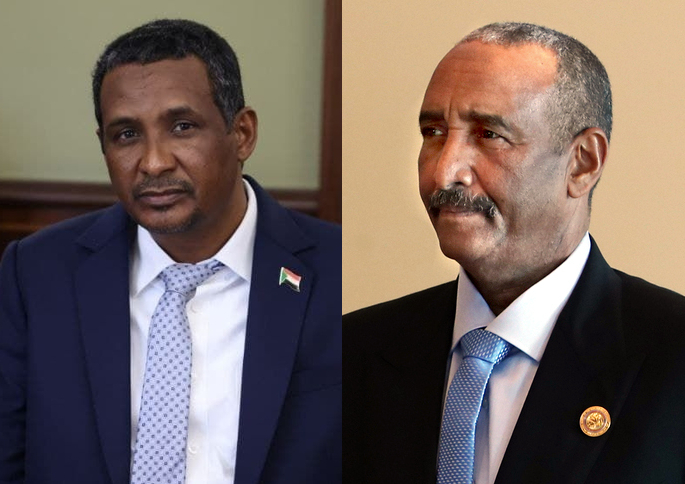Weingarten: On the Sudan crisis
Mohamed Hamdan Dagalo (left) and Abdel Fattah al-Burhan (right) are two generals in the SAF and the RSF, respectively.
April 25, 2023
Truly remarkable stories are coming out of Sudan. One can read the headlines and be unsurprised to see a conflict brewing but also be saddened at progress lost for an already turbulent country. On Sunday, a “full-fledged exodus” of foreign diplomats and government officials took place in an effort to protect them in case the fighting was to escalate even further.
This event forces the question: is this conflict repairable? And if it is, who should be responsible for the clean-up effort? I argue that the Western forces who left Sudan today, along with many other African and Middle Eastern nations, have a large burden to bear.
In 2019, steady protests aimed to oust dictator Omar al-Bashir, and to some extent they worked. Effective U.S. policy and intervention propelled the Sudanese citizens and military to form a “transitional government” according to foreign policy analyst Justin Lynch. In addition, Lynch argues that this agreement was the beginning of the end for democracy in Sudan. Following a strong year or two of protesting and pro-democracy activism, the prime minister, Abdalla Hamdok, was overthrown by a military coup d’état.
After Hamdok was ousted, the U.S. and U.N. supported the same transitional government and were comfortable trusting the military to establish a democratic government.
From the events that are taking place at the moment, it doesn’t appear the military is prepared to give power over to the Sudanese citizens. Gen. Abdel Fattah al-Burhan, the leader of the Sudanese Armed Forces (SAF), and Gen. Mohamed Hamdan Dagalo, leader of the Rapid Support Forces (RSF), have brought Sudan to its knees and do not appear to let up unless one of them is defeated.
While the U.S. and other Western nations should not take all the blame for the instability in Sudan, their peacemaking efforts and aggressive influence on political outcomes made it increasingly difficult for democracy to be transplanted. A “transitional government” isn’t the way you establish a citizen-led government. Instead, the U.S. and U.N. should have supported the Sudanese citizens directly. Perhaps this situation could have been avoided, but it also begs the question of what political objectives the U.S. and other nations had in mind.
That being said, it is of the utmost importance that we, U.S. citizens, are active in vouching for countries like Sudan. Not only are an estimated 16,000 Americans still within Sudan’s borders, but the Sudanese people are also at stake. We must humanize the situation and emphasize the living conditions during wartime (similar to what we have done in Ukraine) and, by doing this, remain hopeful that change is possible.







